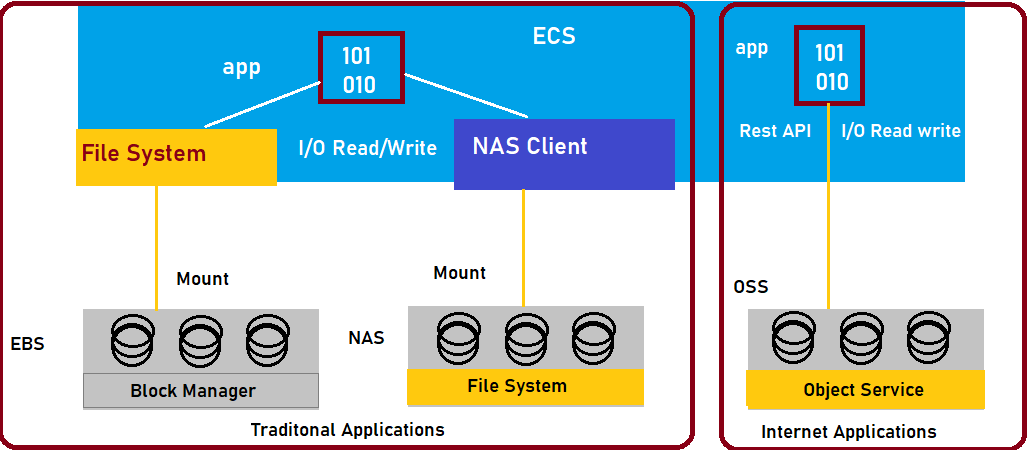By Shantanu Kaushik
Alibaba Cloud has built a network of products and services from the ground up. In-house research and development have led to a paradigm shift in setting industry standards. These industry-leading tools and services have created an overlay of solutions that provide answers to almost every technological query.
When it comes to storage, Alibaba Cloud OSS and Alibaba Cloud File Storage NAS showcase dominance and excellence in operation. In this article series, we are going to discuss and outline some major features, benefits, comparisons, and use-case scenarios of the Alibaba Cloud File Storage NAS.
Alibaba Cloud File Storage NAS follows an architecture that provides standard file access protocols. If you are shifting from on-premises or another cloud provider with a network-attached storage solution (NAS), you will not have to undergo additional configuration or modification of your application(s).
Alibaba Cloud File Storage NAS is a service that works with the Elastic Compute Service (ECS), Container Service for Kubernetes (ACK), and Alibaba Cloud E-HPC. Alibaba Cloud NAS provides a state-of-the-art distributed file system. It offers high-availability and reliability scenarios with unlimited storage. The high-end performance scaling is achieved with high input/output operations per second (IOPS), low latency, and high throughput; the high performance and reliability are coupled with unmatched business dependability and durability.

Alibaba Cloud NAS is a cloud service with a distributed file system. It offers high-scalability, shared access, high-availability, and accelerated performance. It is compatible with native operating systems since it implements POSIX file APIs. NAS is a scalable file system that offers simultaneous file system access to any ECS instance that calls for it. It automatically scales the storage resource based on user operations. Alibaba Cloud NAS allows you to mount the file system on ECS compute nodes for seamless file operations that mimic features, such as local storage.
NAS provides integrated data sources that ensure stable performance for workloads and applications share or distribute the load on multiple ECS instances or servers. NAS provides storage options, such as NAS capacity, NAS performance, and NAS Extreme.
Alibaba Cloud NAS supports the SMB and standard NAS protocols for easy adaptation. It offers a secured platform with integration with Resource Access Management (RAM) for authorization scenarios, Virtual Private Cloud (VPC) for isolation, and security group ACL. NAS supports encryption in transit and encryption at rest to act against any data interception and tampering.
Alibaba Cloud File Storage NAS provides the NAS Capacity file systems and NAS Performance file systems for general usage. Let's look at a comparison between the performance metrics, features, and scenarios of both NAS variants.
| Resource | NAS Performance | NAS Capacity |
| Usage Scenarios | • Offers low latency • Enterprise application • Container Service • DevOps • Microservices • High-throughput, large capacity |
• Offers moderate latency • Cost-sensitive big-data analysis • File sharing and backup • Large capacity and high throughput |
| IOPS | 30,000 | 15,000 |
| Latency | 2 ms | 10 ms |
| Capacity | 0 B - 1 PiB | 0B - 10 PiB |
| Bandwidth | ||
| Scaling | Auto scaling | Auto Scaling |
| Features | • Data Encryption • Performance Monitor • Access Control • Migration • Lifecycle Management • ACL • Quota Management |
• Data Encryption • Performance Monitor • Access Control • Migration • Lifecycle Management • ACL • Quota Management |
Alibaba Cloud NAS allows you to mount file systems on various compute nodes, including the Elastic Compute Service (ECS) instances, ECS Bare Metal Instances, E-HPC nodes, and Alibaba Cloud Container Service for Kubernetes (ACK).
NAS supports synchronous and asynchronous data transmission between NAS file systems and between NAS and Object Storage Service (OSS) using the Data Transmission Service (DTS).
After configuration to establish communication between different virtual private clouds (VPCs) across regions, Alibaba Cloud NAS allows you to mount file systems on compute nodes across regions.
Alibaba Cloud File Storage NAS supports multiple redundancies with data backup the same way the Object Storage Service (OSS) does. File Storage NAS's disaster recovery feature is beneficial for developers and enterprises because it is commonly used in scenarios such as DevOps.
Alibaba Cloud File Storage NAS is a managed service that guarantees high data durability. In any computing scenario, deploying with a fully-managed service cuts down on a lot of hassles when compared to a self-built cloud NAS system or the traditional or conventional NAS system.
Alibaba Cloud NAS offers unbeatable elasticity and ease of operations. Let's take a look at a comparison between the three types of NAS.
| Scenario | Alibaba Cloud NAS | Self-Built NAS | Conventional NAS |
| Elasticity in Storage | Storage auto-scales according to the requirements. Scales up when needed and scales down to cut costs | Not Supported, Manual Operation | Manual Operation and tedious upgrade processes. |
| Availability | No single point of failure (SPOF) and service level agreements (SLAs) ensure 99.9% availability. | Server-downtime will mean service unavailability | SPOF |
| Reliability | Alibaba Cloud Guaranteed 99.999999999% reliability | Tedious server and storage management will be required for data durability and dependability | Data reliability is high, but manual operations make it a tedious job |
| Security | End-to-end permission management, RAM Authorization, and other Alibaba Cloud security products ensure high security. | Protocol level permission management | End-to-end permission management supported |
| Throughput | Horizontally scalable, with linear relationship and storage volumes, ensuring high-throughput | Horizontal scaling not supported, hence low throughput | To maximize throughput, high-end hardware deployment is required, increasing costs. |
| Usage | Managed NAS service that ensures minimum user requirement. Seamless integration with cloud products from the Alibaba Cloud lineup | Server maintenance is expensive and requires complicated processes for management | Manual management and resource orchestration is required for error-free NAS service |
| Technology Support | ECS, ACK, and E-HPC | Resource Demand | Resource Demand |
In the next article in this series on Alibaba Cloud File Storage NAS, we will compare NAS with the Alibaba Cloud Object Storage Service (OSS). Then, we will list the differences between Alibaba Cloud File Storage NAS and Elastic Block Storage (EBS).
We will also discuss all of the usage scenarios of Alibaba Cloud NAS and the part it plays with DevOps practices with container service for Kubernetes (ACK). Lastly, we will discuss high-throughput scenarios that account for business excellence and business continuity.
Alibaba Cloud Recognized as a Top Hosted Serverless Platform in CNCF Cloud Native Survey China 2019
Alibaba Cloud File Storage NAS – Part 2: Use Case Scenarios and Comparison

2,599 posts | 764 followers
FollowAlibaba Clouder - November 12, 2020
Alibaba Clouder - November 26, 2020
Alibaba Clouder - November 17, 2020
Alibaba Developer - February 1, 2021
Alibaba Clouder - April 12, 2021
Alibaba Clouder - November 19, 2020

2,599 posts | 764 followers
Follow Cloud Migration Solution
Cloud Migration Solution
Secure and easy solutions for moving you workloads to the cloud
Learn More Backup and Archive Solution
Backup and Archive Solution
Alibaba Cloud provides products and services to help you properly plan and execute data backup, massive data archiving, and storage-level disaster recovery.
Learn More Data Lake Storage Solution
Data Lake Storage Solution
Build a Data Lake with Alibaba Cloud Object Storage Service (OSS) with 99.9999999999% (12 9s) availability, 99.995% SLA, and high scalability
Learn More Realtime Compute for Apache Flink
Realtime Compute for Apache Flink
Realtime Compute for Apache Flink offers a highly integrated platform for real-time data processing, which optimizes the computing of Apache Flink.
Learn MoreMore Posts by Alibaba Clouder